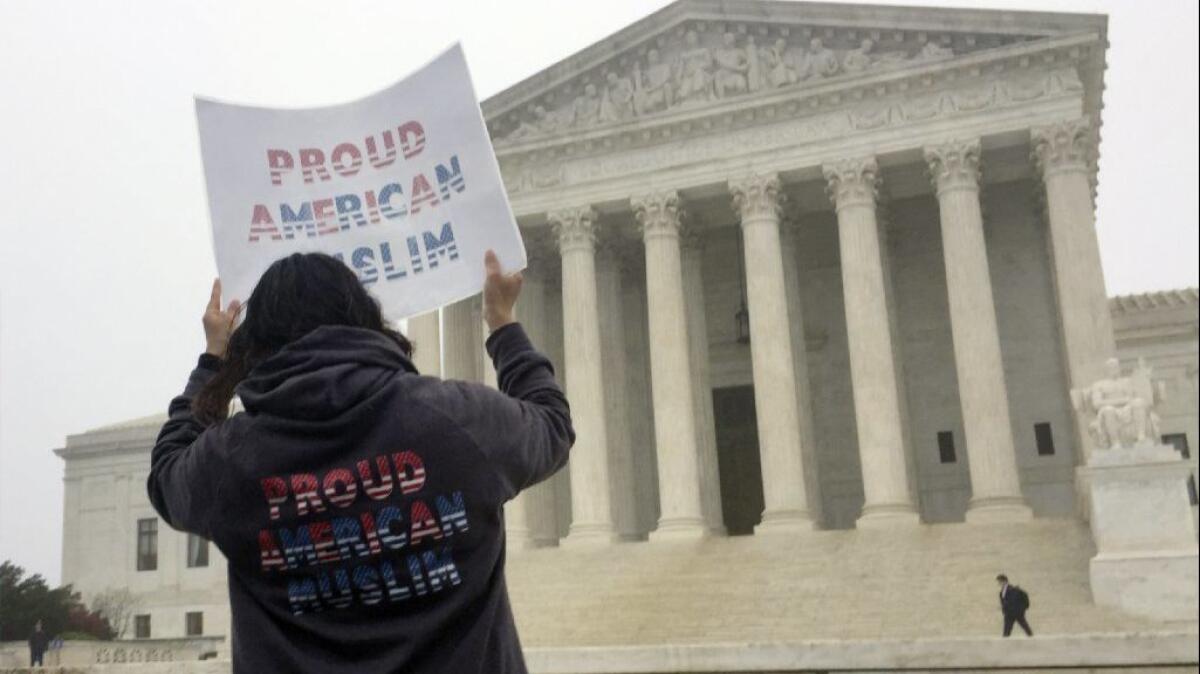Opinion: Same-day audio should be standard for the Supreme Court

As I write this, I am listening to Wednesday’s oral argument at the Supreme Court over the legality of President Trump’s super-“watered-down” travel ban and wondering, not for the first time, why audio recordings of all arguments aren’t streamed on the same day. There really is no good no answer.
It’s important to realize how unusual it is that the public can hear arguments in the case of Trump vs. Hawaii on the same day the lawyers made them, albeit on a slightly delay. As Gabe Roth of Fix the Court notes, this is the first time the court has released audio on the same day since April 28, 2015, the day of the argument in Obergefell vs. Hodges, the same-sex marriage case.
Audio recordings of every other argument in the interim have been posted on the court’s website on Friday, two to four days after lawyers made their case before the justices. (The court hears arguments on Mondays, Tuesdays and Wednesdays during a sitting, and transcripts are posted on the same day.)
Admittedly, Wednesday’s argument, like the one in Obergefell, is unusually newsworthy. But since when are Supreme Court justices editors or news directors? Why not post the audio of every argument on the same day, and allow professional journalists to decide whether excerpts are worth including in the nightly news?
Ah, but what about the concern some justices are said to have about same-day audio resulting in misleading sound bites being retailed in the evening news? But if that’s their objection, why allow same-day audio for the rare “high-profile” case such as those involving the travel ban, same-sex marriage or the constitutionality of the Affordable Care Act?
(It was the March 27, 2012, arguments in the Obamacare case that produced one of the most famous Supreme Court sound bites — then-Justice Antonin Scalia’s comparison of the healthcare law’s individual mandate with a hypothetical law forcing people to buy broccoli.)
Making an exception for “high-profile” cases is also hard to reconcile with one of the other stock arguments against same-day audio: that lawyers who know their words might appear on the TV news will be tempted to grandstand. If you’re inclined to showboat, wouldn’t you do it precisely in those marquee cases?
One possible explanation for the court’s decision to allow same-day audio for the travel ban case is that it was asked to do by Sen. Ted Cruz (R-Texas), the chairman of the Senate Judiciary Committee’s subcommittee on the Constitution, and his Democratic counterpart, Sen. Mazie Hirono of Hawaii. In a letter to Chief Justice John G. Roberts Jr. in March, the senators cited “heightened national interest” in the case as a reason for same-day audio. But since when does the court do Congress’ bidding?
Any way you look at it, the court’s selective policy on same-day audio makes no sense. If citizens can read the arguments on the day they are made, they ought to be able to listen to them — whether the case is “high-profile” or snore-inducing.
And, for the record, my bet for evening-news sound bite is this exchange between Justice Elena Kagan and Solicitor Gen. Noel Francisco:
KAGAN: General, this is a[n] out-of-the-box kind of president in my hypothetical. And —
FRANCISCO: We — we — we don’t have those, Your Honor.
You can listen to it here.
Follow the Opinion section on Twitter @latimesopinion and Facebook
More to Read
A cure for the common opinion
Get thought-provoking perspectives with our weekly newsletter.
You may occasionally receive promotional content from the Los Angeles Times.







